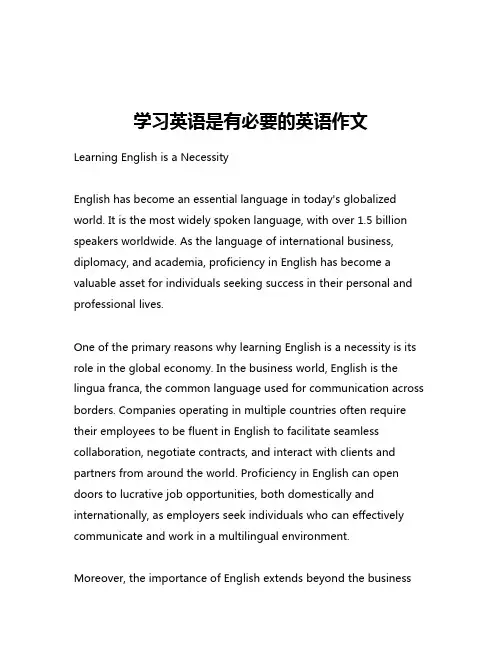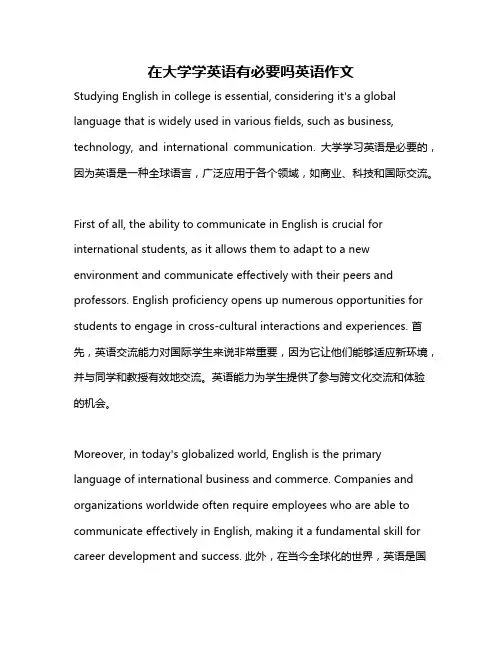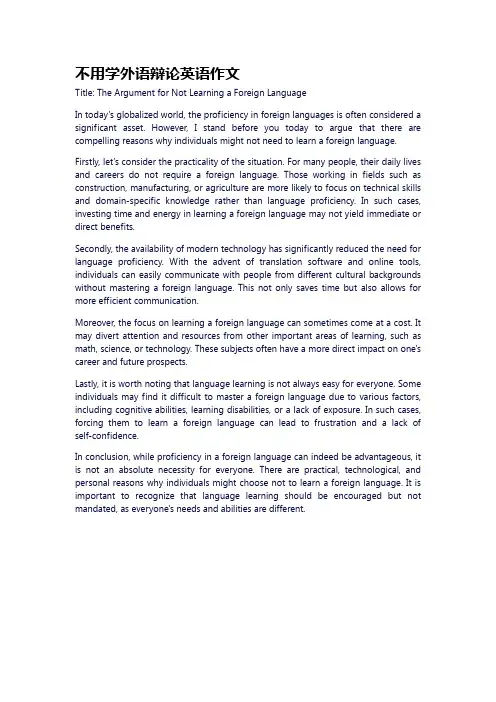中国的学生应不应该学英语(英文辩论稿)A
- 格式:doc
- 大小:42.50 KB
- 文档页数:5

学习英语是有必要的英语作文Learning English is a NecessityEnglish has become an essential language in today's globalized world. It is the most widely spoken language, with over 1.5 billion speakers worldwide. As the language of international business, diplomacy, and academia, proficiency in English has become a valuable asset for individuals seeking success in their personal and professional lives.One of the primary reasons why learning English is a necessity is its role in the global economy. In the business world, English is the lingua franca, the common language used for communication across borders. Companies operating in multiple countries often require their employees to be fluent in English to facilitate seamless collaboration, negotiate contracts, and interact with clients and partners from around the world. Proficiency in English can open doors to lucrative job opportunities, both domestically and internationally, as employers seek individuals who can effectively communicate and work in a multilingual environment.Moreover, the importance of English extends beyond the businessrealm. In the field of academia, English is the predominant language of instruction, research, and publication. Students and scholars who aim to pursue higher education or participate in international conferences and research projects must possess a strong command of English. The ability to read, write, and communicate in English allows them to access a vast wealth of information, collaborate with peers from diverse backgrounds, and contribute to the global exchange of knowledge.In the realm of diplomacy and international relations, English serves as the primary language of communication. Diplomats, government officials, and international organizations rely on English to negotiate treaties, conduct negotiations, and engage in cross-cultural dialogue. Proficiency in English enables individuals to effectively represent their countries, participate in global discussions, and contribute to the resolution of international issues.Beyond the professional and academic spheres, learning English also offers personal benefits. English is the dominant language of popular culture, with a vast array of literature, films, music, and entertainment available in English. Fluency in English allows individuals to fully immerse themselves in these cultural offerings, broadening their horizons and enhancing their understanding of the world. Additionally, the ability to communicate in English facilitates travel and cultural exchange, enabling individuals to connect with peoplefrom different backgrounds and gain a deeper appreciation for diverse perspectives.Furthermore, the learning of English can have a positive impact on cognitive development. Studies have shown that individuals who are proficient in multiple languages, including English, often exhibit enhanced problem-solving skills, improved memory, and greater cognitive flexibility. These cognitive benefits can translate into academic and professional success, as well as personal growth and fulfillment.In conclusion, learning English is a necessity in today's interconnected world. It is the language of global business, academia, diplomacy, and culture, opening up a world of opportunities for those who possess proficiency in it. Whether one's goal is to secure a lucrative job, pursue higher education, engage in international relations, or simply immerse oneself in the rich tapestry of global culture, the mastery of English is a valuable asset that can significantly enhance one's personal and professional prospects. As the world continues to become more interconnected, the importance of learning English will only continue to grow, making it an essential skill for individuals seeking to thrive in the 21st century.。

应不应该要学习外语的英语作文English:Learning a foreign language, especially English, is essential in today's globalized world. English has become the lingua franca of business, science, technology, and international communication. Without a good command of English, one may miss out on academic and career opportunities. Additionally, learning a new language opens up new perspectives, challenges our cognitive abilities, and enhancesour communication skills. It allows us to connect with people from different cultures and backgrounds, fostering understanding and respect. Overall, studying a foreign language like English is not only beneficial on a practical level but also enriching on a personal and cultural level.中文翻译:学习外语,尤其是英语,在当今全球化的世界中至关重要。
英语已成为商业、科学、技术和国际交流的通用语言。
若不能熟练掌握英语,一个人可能会错失学术和职业机会。
此外,学习一门新语言能够开拓新的视角,挑战我们的认知能力,增强我们的交流技能。

学生应不应该学习英文作文下载温馨提示:该文档是我店铺精心编制而成,希望大家下载以后,能够帮助大家解决实际的问题。
文档下载后可定制随意修改,请根据实际需要进行相应的调整和使用,谢谢!并且,本店铺为大家提供各种各样类型的实用资料,如教育随笔、日记赏析、句子摘抄、古诗大全、经典美文、话题作文、工作总结、词语解析、文案摘录、其他资料等等,如想了解不同资料格式和写法,敬请关注!Download tips: This document is carefully compiled by theeditor. I hope that after you download them,they can help yousolve practical problems. The document can be customized andmodified after downloading,please adjust and use it according toactual needs, thank you!In addition, our shop provides you with various types ofpractical materials,such as educational essays, diaryappreciation,sentence excerpts,ancient poems,classic articles,topic composition,work summary,word parsing,copyexcerpts,other materials and so on,want to know different data formats andwriting methods,please pay attention!Students should definitely study English composition. It's a great way to improve their language skills and express their thoughts and ideas in a clear and concise manner. Plus, it's a valuable skill that can be used in many different areas of life.Learning to write in English can also help students become more confident in their communication abilities. It gives them the opportunity to practice organizing their thoughts and presenting them in a logical and coherent way. This can be incredibly beneficial in both academic and professional settings.Additionally, studying English composition can expose students to different styles of writing and help them develop their own unique voice. It encourages creativity and critical thinking, which are essential skills for success in any field.Overall, learning English composition is a valuable and worthwhile endeavor for students. It not only improvestheir language skills, but also helps them develop important communication and critical thinking skills that will benefit them in the long run.。

在大学学英语有必要吗英语作文Studying English in college is essential, considering it's a global language that is widely used in various fields, such as business, technology, and international communication. 大学学习英语是必要的,因为英语是一种全球语言,广泛应用于各个领域,如商业、科技和国际交流。
First of all, the ability to communicate in English is crucial for international students, as it allows them to adapt to a new environment and communicate effectively with their peers and professors. English proficiency opens up numerous opportunities for students to engage in cross-cultural interactions and experiences. 首先,英语交流能力对国际学生来说非常重要,因为它让他们能够适应新环境,并与同学和教授有效地交流。
英语能力为学生提供了参与跨文化交流和体验的机会。
Moreover, in today's globalized world, English is the primary language of international business and commerce. Companies and organizations worldwide often require employees who are able to communicate effectively in English, making it a fundamental skill for career development and success. 此外,在当今全球化的世界,英语是国际商务和贸易的主要语言。

应不应该学英语作文Learning English is essential in today's globalized world. It opens up opportunities for communication and collaboration with people from different countries and cultures.English is the language of international business and diplomacy, so having a good command of English can give you a competitive edge in the job market.In addition, learning English can broaden your horizons and expose you to new ideas and perspectives. It allows you to access a wealth of information and resources that are only available in English.Furthermore, English is the language of the internet, so being proficient in English can help you navigate online platforms and connect with people from around the world.On the other hand, some may argue that learning Englishis unnecessary, especially if you don't plan on working or studying in an English-speaking country. However, intoday's interconnected world, English proficiency can still be beneficial in various aspects of life.Overall, whether or not you should learn English ultimately depends on your personal goals and aspirations. But in a world where English is becoming increasingly important, acquiring English language skills can be a valuable asset.。

我们应该学英语吗作文The Importance of Learning English.English, a global language with over a billion speakers worldwide, has become an integral part of modern communication. The question of whether we should learn English often arises, especially in the context of education and career development. This essay aims to explore the various reasons why learning English is beneficial and how it can shape our future.Firstly, English is the lingua franca of the international community. It is the official language of numerous countries and organizations, including the United Nations, the World Trade Organization, and theInternational Monetary Fund. As a result, proficiency in English opens doors to a world of opportunities. It allows us to engage with a diverse range of people, cultures, and ideas, thereby broadening our horizons and enriching our lives.Secondly, English is the language of global business and finance. Many multinational companies and international brands use English as their corporate language. By learning English, we can gain access to a wealth of business resources, market research, and industry trends. This knowledge can be leveraged to succeed in today's competitive global economy.Moreover, English is a gateway to higher education. Many of the world's top universities and research institutions require or prefer English as the language of instruction. By mastering English, we can pursue advanced degrees and specialized courses that are not available in our native languages. This not only enhances our professional credentials but also equips us with the skills and knowledge necessary to contribute to society.Additionally, English is a powerful tool for personal development. It enhances our cognitive abilities, improves our memory and concentration, and expands our vocabulary and grammar. Through reading, writing, speaking, andlistening in English, we can develop our analytical thinking, critical reasoning, and creative expression. These skills are invaluable in various aspects of life, including academic performance, career success, and interpersonal communication.Moreover, English is a bridge to other languages and cultures. Many languages, including Spanish, French, German, and Chinese, borrow vocabulary and grammatical structures from English. By learning English, we can more easily understand and learn these languages, thereby expanding our multilingual abilities. Additionally, a strong grasp of English can help us appreciate literature, music, art, and cinema from around the world, enhancing our understanding and respect for diverse cultural perspectives.In conclusion, learning English is a valuableinvestment that can yield significant returns throughoutour lives. It opens up opportunities for education, career advancement, and personal growth. It allows us to engagewith the global community, understand different cultures, and contribute to a more interconnected and inclusive world.Therefore, we should embrace the learning of English as a critical skill for success in today's interconnected world.。

不用学外语辩论英语作文Title: The Argument for Not Learning a Foreign LanguageIn today's globalized world, the proficiency in foreign languages is often considered a significant asset. However, I stand before you today to argue that there are compelling reasons why individuals might not need to learn a foreign language. Firstly, let's consider the practicality of the situation. For many people, their daily lives and careers do not require a foreign language. Those working in fields such as construction, manufacturing, or agriculture are more likely to focus on technical skills and domain-specific knowledge rather than language proficiency. In such cases, investing time and energy in learning a foreign language may not yield immediate or direct benefits.Secondly, the availability of modern technology has significantly reduced the need for language proficiency. With the advent of translation software and online tools, individuals can easily communicate with people from different cultural backgrounds without mastering a foreign language. This not only saves time but also allows for more efficient communication.Moreover, the focus on learning a foreign language can sometimes come at a cost. It may divert attention and resources from other important areas of learning, such as math, science, or technology. These subjects often have a more direct impact on one's career and future prospects.Lastly, it is worth noting that language learning is not always easy for everyone. Some individuals may find it difficult to master a foreign language due to various factors, including cognitive abilities, learning disabilities, or a lack of exposure. In such cases, forcing them to learn a foreign language can lead to frustration and a lack of self-confidence.In conclusion, while proficiency in a foreign language can indeed be advantageous, it is not an absolute necessity for everyone. There are practical, technological, and personal reasons why individuals might choose not to learn a foreign language. It is important to recognize that language learning should be encouraged but not mandated, as everyone's needs and abilities are different.。

对于学习英语好坏都英语辩论会英语作文Learning English: The Great DebateHello everyone! My name is Emily and I'm a fifth grader at Oakwood Elementary School. Today, I'm going to share my thoughts on a very important topic – should kids learn English or not? There are good points on both sides, so let's dive into the great debate!On the one hand, learning English can be really beneficial for us students. English is spoken in so many countries around the world, so knowing it helps us communicate with lots of different people. My parents always say that English opens many doors and opportunities, like getting better jobs in the future or traveling abroad more easily. They remind me that lots of books, movies, games, and websites are in English too. So by learning it, I can understand and enjoy those things better.Another great reason to learn English is that it's often used in computer programming, science, and at international companies and organizations. My older brother Andy is really into coding, and he told me that knowing English is super important for that. If I want to have a cool job like him someday,learning English gives me an advantage. It's considered one of the most important languages for business too.But on the other hand, learning English is definitely not easy, especially for kids like me. It has so many weird spelling rules and grammarrules that don't make sense. Why is "though" spelled that way when it sounds like "toe"? Ridiculous! And where do you put apostrophes again? See, I get confused just thinking about it. My parents hired an English tutor for me, but it's still really hard. I often feel stressed about remembering all the vocabulary and sentence structures.Not only is English itself difficult, but it also takes a lot of time and effort to learn. I have to go to extra English classes after school, and do tons of homework like writing essays (which is how I'm practicing for this debate!). That means I have much less free time to play outside with my friends or do fun activities I enjoy. Instead of making potholders with my Girl Scout troop, I'm stuck conjugating verb tenses. Bor-ing!Some people also argue that learning English can negatively impact your ability to learn your native language really well. My friend Jasmine's parents only speak to her in English now, and she's forgetting how to speak their family's native language of Vietnamese. I think it's important to keep your cultural roots andnot let a foreign language like English overshadow your heritage language and customs.Another downside is that if everyone just learns English, it could mean other languages disappear over time. There's so much diversity in the world in terms of languages, traditions, and ways of life. If we all just use English to communicate, we might lose that uniqueness which makes communities special. My grandparents don't speak any English, so I'd hate to not be able to talk to them because I forgot our native language.So as you can see, there are pros and cons to consider when it comes to learning English. On one side, it opens doors, creates opportunities, and connects you to so much knowledge and culture around the world. But on the other side, it's incredibly difficult, demands a lot of time and effort, and could negatively impact your heritage language and traditions.Personally, I lean towards thinking that the benefits outweigh the costs, but I don't think it's an easy decision. I'll keep working hard in my English classes, while also nurturing my skills in my family's native language. That way, I can become bilingual and get to experience the best of both worlds!No matter what you decide, the important thing is to keep an open mind and respect everyone's individual choices.Language is a central part of a person's identity, so we should all feel free to explore different tongues or stick to our roots as we see fit. As long as we communicate with kindness, courage, and curiosity, anything is possible!Those are just my thoughts as a 10-year-old kid, but I'd love to hear your perspectives too. Let's keep this great debate going so we can all learn from each other. Thanks for listening, friends!。

China's children want to study English from the elementary school, the big city's study early, is the junior middle school, the high school, the university, the graduate student enters a school, must study English completely, must pass through English the test, under China present educational mode, English, said worrying is most consumes the energy a class, here has an ordinary mathematical formula everybody to understand, is China's students must spend several year expenditure approximately at the matter which the foreign child does not need to take into consideration, this on enormous limit China's students in other area of knowledge hobby and development accumulation.中国的孩子从小学就要学习英语,大城市的学习更早,然后是初中、高中、大学、研究生入学,全部都要学习英语,都要经过英语的考验,在中国目前的教育方式之下,英语,堪忧说是最耗费精力的一门课,这里有一个普通的算式大家都理解,就是中国的学生大约要花十几年的时间花费在外国小孩无须顾及的事情上,这就极大的限制了中国的学生在其他知识领域的爱好和发展积累。

对于学习英语好坏都英语辩论会英语作文全文共3篇示例,供读者参考篇1The Great English Debate: To Learn or Not to Learn?Fellow students, esteemed faculty, and guests, I welcome you all to tonight's riveting debate on a topic that has sparked controversy and divided opinions across the globe – the pursuit of learning the English language. As we gather here, allow me to present both sides of this multifaceted argument, exploring the merits and drawbacks of dedicating oneself to the acquisition of what has become the world's lingua franca.On the one hand, the case for learning English is undeniably compelling. In our increasingly interconnected world, English has emerged as the universal language of communication, transcending borders and facilitating cross-cultural exchanges. Proficiency in English opens doors to a wealth of opportunities, both academic and professional. From accessing cutting-edge research and scholarly articles to navigating the global business landscape, a command of English is often the key that unlocks success.Moreover, English serves as a gateway to understanding diverse cultures and perspectives. Through the study of English literature, one can immerse themselves in the rich tapestry of human experiences, emotions, and worldviews. From the eloquent verses of Shakespeare to the profound narratives of Toni Morrison, the English language offers a vast repository of knowledge and artistic expression, fostering intellectual growth and cultural appreciation.Furthermore, the acquisition of English equips individuals with invaluable skills that extend beyond mere linguistic competence. Critical thinking, effective communication, and analytical reasoning are all honed through the study of this intricate language. These transferable skills are highly sought after in various fields, ranging from diplomacy to academia, and can serve as powerful tools for personal and professional advancement.However, there is a compelling counterargument that challenges the notion of English as an indispensable pursuit. Critics argue that the dominance of English poses a threat to linguistic diversity and cultural preservation. As the world increasingly adopts English as a common tongue, there is a risk of marginalization and eventual extinction of lesser-spokenlanguages, each carrying its unique heritage and cultural richness.Additionally, the emphasis on English proficiency can perpetuate existing power dynamics and reinforce linguistic imperialism. The privileging of English as the language of commerce, education, and global discourse can inadvertently relegate non-native speakers to a disadvantaged position, hindering their ability to fully participate and express themselves on an equal footing.Furthermore, the pursuit of English fluency often comes at a significant cost, both financial and personal. Intensive language courses, tutoring, and immersion programs can strain limited resources, particularly in developing nations where access to quality education may be limited. The time and effort invested in mastering English could arguably be better allocated to developing skills and knowledge more directly relevant to local contexts and pressing societal needs.As we navigate this intricate debate, it becomes evident that there are no easy answers or clear-cut solutions. The decision to learn or forgo the study of English is a deeply personal and contextual one, influenced by individual aspirations, cultural backgrounds, and societal realities.Perhaps the most prudent approach lies in striking a delicate balance – embracing the benefits of English proficiency while simultaneously cherishing and preserving one's native tongue and cultural heritage. By fostering multilingualism and promoting linguistic diversity, we can harness the power of English as a tool for global communication while safeguarding the richness of our diverse linguistic tapestry.In conclusion, the debate surrounding the learning of English is a complex and multifaceted one, with compelling arguments on both sides. While the practical advantages of English proficiency are undeniable, we must remain vigilant in protecting linguistic diversity and addressing the potential pitfalls of linguistic hegemony. Ultimately, the path forward lies in fostering mutual understanding, celebrating our differences, and recognizing that the true value of language lies not in its dominance but in its ability to connect us as a global community.篇2The Great English Language DebateWelcome one and all to this momentous debate on the English language and whether learning it is a boon or bane forstudents. Today, we have two speakers who will argue the opposing viewpoints with gusto!First up, we have Emma Englishlover who will be advocating for why learning English is an amazing opportunity that every student should embrace. Emma, the floor is yours!Emma: Thank you, thank you. My fellow students, can I get an 'English is awesome!' from the crowd? Today, I'm here to make an impassioned case for why learning the English language is one of the best things we can do for our education and future prospects.To begin with, English is the world's lingua franca - the common language that allows billions of people across the globe to communicate. By mastering English, we open doors to cultures, ideas, and opportunities that would otherwise remain closed. Need to study cutting-edge research? Most academic papers are published in English. Want to work at a multinational corporation? You'll need English. Hoping to make friends from різних куточків світу? English is your golden ticket!But learning English isn't just about pragmatism; it unlocks entire universes of literature, movies, music, and art. From the soaring verses of Shakespeare to the lyrical genius of KendrickLamar, English allows us to access the deepest outpourings of the human experience. We'd be poorer in every sense without it.Of course, any language carries within it an entire worldview and philosophy. By learning English and its rich cultural context, we gain profound insights into Western civilization - its values, history, and the movements that have shaped the modern era. We become true global citizens.And let's be real - English sounds awesome! Those crisp consonants, velvety vowels, and linguistic borrowings from myriad languages? Chef's kiss! Learning English is to engage in a veritable musicality of speech.So embrace this gift, my friends! Let English be the torch that illuminates your path to a brighter, more connected future. Who's with me? Let's make it happen!Moderator: What a passionate appeal! Emma has certainly made a compelling case. But now let's hear from Charlie Englishfoughi who will be arguing against compulsory English education. The floor is yours, Charlie!Charlie: Thanks, yeah, that was a nice little fairytale Emma spun, but I'm here to blast that fiction with some hard truths. And my opening statement is this - prioritizing English isn't justmisguided, it's linguistic imperialism that actively undermines students' intelligence and self-worth.Look around this room; we're fortunate enough to have dozens of native languages represented here, rich ancestral tongues containing the historical memories and traditional knowledge systems of our peoples. Every time we sacrifice study of those languages to make room for more English, we do violence to that sacred legacy. We erase parts of our identity.And for what? So we can be indoctrinated into Western capitalist ideologies under the guise of becoming 'global citizens'? Thanks, but I'll pass on that hegemonic nonsense. Our languages and worldviews have profundity that isn't contained or valued in the English linguistic sphere.Plus, the cognitive impacts of replacing our mother tongues are well-documented. Students forced to learn in a non-native language from an early age experience lowered comprehension, poor skill transferral between subjects, and even developmental delays. We're literally making our students less intelligent for the sake of English!And can we talk about how English is encoded with deep racial, gendered, and cultural biases? The lack of feminine nouns, dominance of masculine metaphors, Anglocentric ideals ofbeauty and respectability - we're asking students to swim in linguistic waters that were never meant for them. It's a form of psychological oppression.Instead of wasting time on English, we should be uplifting our own languages and championing their revival, systematization, and academic formalization. Imagine if our engineers wrote code comments and research papers in Navajo - the beauty and rigor that could be expressed! That's the future of true liberation.So I say to you all, let's ditch this English obsession for good. Our languages matter, our identities matter. Who's with me?¡Vámonos!Moderator: Well, there you have it folks - two diametrically opposed but equally passionate perspectives. Who do you think had the more persuasive argument? Or perhaps you see merits in both sides? Whatever your view, this has certainly been a thought-provoking debate that gets to the heart of issues like globalization, linguistic imperialism, cognition, identity, and more. Food for thought indeed...篇3The Great English Language DebateAs students, we're constantly faced with the question: should we devote time and effort to learning English? Thisage-old debate has raged on for decades, with valid arguments on both sides. Today, I'll explore the pros and cons of prioritizing English language acquisition, and hopefully, by the end, you'll have a clearer perspective on this contentious issue.On the one hand, learning English undoubtedly offers a myriad of benefits that can propel us towards personal and professional success in our increasingly globalized world.Firstly, English is the lingua franca of the modern era, serving as the language of international communication, business, and academia. By becoming proficient in English, we gain access to a wealth of knowledge and opportunities that would otherwise remain out of reach. From studying cutting-edge research papers to communicating with colleagues and clients worldwide, English opens doors that would remain firmly shut without it.Moreover, English proficiency is often a prerequisite for securing lucrative job opportunities, both locally and abroad. In today's competitive job market, employers seek candidates who can effectively communicate and collaborate across cultural boundaries. By mastering English, we increase our marketabilityand broaden our career prospects, potentially leading to higher earning potentials and more fulfilling careers.Furthermore, learning English can foster cross-cultural understanding and appreciation. As we delve into the nuances of the language, we inevitably gain insights into the customs, values, and ways of thinking of English-speaking cultures. This exposure can lead to greater empathy, tolerance, and respect for diversity, qualities that are invaluable in our increasingly interconnected world.On the other hand, critics argue that prioritizing English language acquisition can come at a significant cost, both culturally and intellectually.One major concern is the potential erosion of our native languages and cultural identities. By placing an inordinate emphasis on English, we risk marginalizing our own linguistic heritage and the rich tapestry of traditions and customs that accompany it. This cultural dilution could lead to a homogenization of our societies, robbing us of the diversity that makes our world so vibrant and fascinating.Additionally, there is a valid argument that learning English can be a highly challenging and resource-intensive endeavor, particularly for those from non-English-speaking backgrounds.The time and effort required to achieve fluency could detract from other crucial areas of study or personal development, potentially hindering our overall growth and well-being.Furthermore, some critics contend that the dominance of English as a global language perpetuates linguistic imperialism and reinforces the hegemony of Western cultures. By prioritizing English, are we inadvertently contributing to the marginalization of other languages and cultures, thereby undermining the principles of linguistic diversity and equality?Ultimately, the decision to prioritize English language acquisition is a deeply personal and contextual one. While the benefits of English proficiency are undeniable in our globalized world, we must also carefully weigh the potential costs and consider our individual circumstances and goals.Perhaps the solution lies in striking a balance – embracing English as a valuable tool for communication and opportunity while simultaneously cherishing and preserving our native languages and cultural identities. By fostering multilingualism and celebrating linguistic diversity, we can reap the rewards of English proficiency while safeguarding the richness of our cultural heritage.As students, it is our responsibility to approach this debate with open minds and critical thinking. We must carefully consider the arguments on both sides, recognizing the nuances and complexities inherent in this issue. Only then can we make informed decisions that align with our values, aspirations, and the collective well-being of our societies.In the end, the great English language debate is not azero-sum game. It is a dialogue that demands our thoughtful engagement and a willingness to find common ground. For it is through respectful discourse and a genuine appreciation for diverse perspectives that we can navigate this intricate issue and ultimately arrive at a harmonious synthesis, one that empowers us to thrive in a world that is both globally connected and culturally rich.。

学外语有必要吗英语作文英文回答:Is it necessary to learn a foreign language? This is a question that has been debated for years. Some people argue that learning a foreign language is essential in today's globalized world, while others believe that it is not necessary. In my opinion, learning a foreign language is indeed important.Firstly, learning a foreign language can greatly enhance our communication skills. In today's interconnected world, being able to communicate with people from different countries and cultures is becoming increasingly important. By learning a foreign language, we can break down language barriers and connect with people from all over the world. For example, I have a friend who speaks fluent Spanish. Whenever we travel to a Spanish-speaking country, she is able to communicate effortlessly with the locals, which makes our travel experience much more enjoyable andmeaningful.Secondly, learning a foreign language can open up a world of opportunities. Many companies and organizationsnow operate on a global scale, and having the ability to speak a foreign language can give us a competitive edge in the job market. For instance, a study conducted by the British Council found that 75% of employers in the UK consider language skills to be important for their business. Therefore, by learning a foreign language, we can increase our chances of finding a good job and advancing in our careers.Furthermore, learning a foreign language can also broaden our horizons and deepen our understanding ofdifferent cultures. Language is deeply intertwined with culture, and by learning a foreign language, we can gain insights into the customs, traditions, and values ofanother culture. This can foster tolerance, respect, and empathy towards people from different backgrounds. For example, when I learned French, I also learned about therich history and art of France, which made me appreciatetheir culture even more.In conclusion, learning a foreign language is indeed necessary in today's globalized world. It can improve our communication skills, open up opportunities, and broaden our horizons. Whether it is for personal or professional reasons, learning a foreign language is a valuable asset that can enrich our lives in many ways.中文回答:学习一门外语是否有必要?这是一个长期以来一直存在争议的问题。
。 -可编辑修改- 辩题:选择高考还是出国继续学业
姓 名 宿小龙 王茹 王九龙 赵梓涵 李嘉欣 徐伟玉
学 号 120111405 120111442 120111424 120111436 120111434 12011144
7
Sparking words: 1. grasp掌握 2. adapt适应 3 relieve缓解,释放 4. confronted with面临 5. expected to do期望做某事
正方一: In my opinion, it is a good thing that more Chinese people go abroad. There are three reasons. First, the overseas learners can improve their ability through the study. They can grasp advanced technologies and their language ability can be improved as well. Second, with the rapid development of China, more and more overseas learners will choose come back, using their abundant knowledge studied abroad to serve for the 。 -可编辑修改- motherland. The third, the government and most domestic enterprises are willing to
provide favorable treatments to attract them to come back.
在我看来,这是一件好事,更多的中国人民出国。原因有三。首先,海外学生可以通过提高他们的学习能力。他们能掌握先进的技术和他们的语言能力可以提高。其次,随着中国的迅速发展,越来越多的海外学习者会选择回来,用他们丰富的知识,为留学为祖国的活动。第三,政府和国内企业最愿意提供优惠待遇,以吸引他们回来。
反方一:However, "Every coin has its two sides". Studying abroad also brings about many disadvantages. Firstly, students will be confronted with so many psychological problems. They often feel lonely and helpless in a new environment. Furthermore, the tuition is very high, which is a very heavy financial burden to the average people. 然而,每个硬币总有正反两面。出国留学也有弊端。第一,学生面临许多心理问题,在新的环境里他们总感觉孤独和无助。此外,对于大多数人来说学费是很昂贵的。
正方二:The other side of a debate to tell us that high school graduates to go abroad Because students can not adapt, so more harm than good. Indeed a foreign country, the challenge is there, but no difficulty that can't be conquered in the world. The challenge, 12-year-old Zhan Tianyou get used, then we 18,9-year-old high school graduates, much better than before in how the learning environment but it can not meet the ? Other students can not say that because psychological adjustments, then I ask, if you do not let the child exercise, it has to adapt to have that day? I think ,Abroad to study, can exercise the maximum [ˈmæksiməm] degree of self-development into self, to make it more perfect。 。 -可编辑修改- 我方以为不然,一一提出,共同商榷。对方一辩告诉我们,高中毕业生出国留学因为适应不了,所
以弊大于利。诚然异国他乡,挑战是有的,但挑战是可以克服的。这种挑战,12岁的詹天佑适应得了,那么我们今天18、9岁的高中毕业生,在比以前好得多的学习生活环境中怎么反而适应不了了呢?对方同学说是因为心理适应不了,那么请问,如果你不让孩子锻炼,那么有适应得了的那一天吗?出国留学,可以在最大成度上锻炼自我发展自我,使之更加完美。
反方二:I don't think so. Students abroad find no kin to turn to, trouble no one talk, distant relatives to understand these difficulties, more difficult to help, if not relieved, but may have psychological disease. Strong personality and lonely patience, is outside the factors that must be considered in the financial. If you get the diploma, and get a work permit or even permanent resident status, with regard to emotional problems are more prominent. 我不这样认为, 学生在国外举目无亲,遇到困难无人倾诉,遥远的亲人无法理解这些困难,更难以施以援手,若不能自行缓解,则可能产生心理疾病。坚强一些的性格和对寂寞的忍耐,是在财力之外必须考虑的因素。若顺利拿到毕业证书,又拿到了工作准证甚至永久居民身份,关于情感的问题则更加突出。
正方三:I think students study abroad, this is a lot of people who can not be expected to go abroad is not something that can not think of going abroad, like studying abroad can not, imagine the case, may also be so secure in my sitting here saying "do not "it? Reason I bid. Abroad to study, if not successful, return to work after the work has a thick margin, can also not successful in China, know that I do not argue that a bit of Friends will also be very clear. And so on, there are many, but on these points, is enough to prove: study abroad, 。 -可编辑修改- more good than harm!
出国留学,这是一个很多不能出国的人可望不可即的事情,可以出国却不想出,想出国深造的却不能,试想这样的话,我国还可能这样稳稳的坐在这里说“不”吗? 出国留学,如果说不成功的话,回国后一样可以有很厚裕的工作,可,同样在国内不成功的话,知道我不说个位辩友也会非常清楚。等等,还有很多,但是就这几点,足足可以证明:出国留学,利大于弊!
反方三: But I think, at the beginning of the overseas student, facing environmental change and life of learning pressure, and as far as possible to make money, the body a little attention, is very easy to fall ill, there are examples of physical collapse. Some parents even though shrewd, but no foreign real life experience, can only be based on hearsay approximate annual cost, in order to prevent the Extra-budgetary Expenditure or insurance purposes, plus a certain percentage, to cope with the possible period of want or need. But students do not have financial management experience, not even hungry experience, it will be difficult to six months or even a year spent planning well, not to mention those indiscriminate spending. 初到国外的学生,面临环境的变化和生活学习的压力,又尽可能的打工挣钱,身体稍不注意,十分容易生病,不乏身体垮掉的例子。有些家长尽管精明,但毕竟没有国外生活的实际经验,只能根据道听途说大概估算出每年的费用,为防止预算外支出或保险起见,加一定的百分比,以应付不时之需。但学生没有理财的经验,甚至没有挨饿的经历,很难将半年甚至一年的花费计划周全,更不用说那些随意乱花钱的主了。